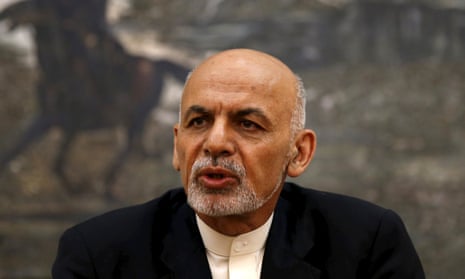Pakistan’s capital city has become the venue for direct talks between the Taliban and a senior member of the Afghan government, raising hopes of a political breakthrough even as Kabul was hit by two separate suicide attacks.
Few details were made public about the first known talks between the two sides, held in the hugely symbolic location of Islamabad. A tweet from the office of the Afghan president, Ashraf Ghani, said that members of the officially sanctioned high peace council had gone for “negotiations with the Taliban” on Tuesday. Pakistan’s foreign office spokesman said he knew nothing about the talks.
A delegation from the High Peace Council of Afghanistan has traveled to Pakistan for negotiations with the Taliban.
— ارګ (@ARG_AFG) July 7, 2015
Intelligence officials said the two sides would break the ice over iftar, the sunset meal that for Muslims marks the end of a day’s fast during the month of Ramadan. Formal talks would then take place on Wednesday at an unnamed location, with Chinese diplomats invited to attend as observers, one official said.
China is increasingly worried about instability and Islamist insurgency on its south-west flank and has been playing a growing role in efforts to broker a settlement between the Afghan government and the Taliban. A meeting between Afghan and Taliban officials took place under Chinese auspices in the western city of Urumqi in May.
The Pakistani intelligence official said there was a chance that US officials would also attend some of the Islamabad meetings. The official said there were three men on the Taliban team, but refused to reveal their names. A Taliban spokesman said he had no information about the talks and was unable to comment.
Although the high peace council is meant to operate independently of the government, the four-man Afghan team included the deputy foreign minister, Hekmat Karzai, a nephew of the former president Hamid Karzai, who has been a fierce critic of Ghani’s efforts to improve relations with Pakistan.
Pakistan’s prime minister, Nawaz Sharif, said the talks were “a major breakthrough”. During a visit to Norway, he said: “I hope there will be a positive outcome, which will certainly be very helpful for peace and stability in Afghanistan.” In Kabul, a suicide car bomber targeted a Nato vehicle, injuring three people. Later, a guard was killed at an office of the Afghan spy agency when three insurgents attempted to storm the building.
Most observers agree that only a political settlement can significantly reduce the violence, but Ghani has been severely criticised at home for his attempts to enlist the help of Pakistan to bring the Taliban to the peace table.
Many Afghans hold Pakistan responsible for backing the Taliban in the first place and say Ghani’s concessions have failed to win results. Ghani’s government was particularly criticised for signing an intelligence-sharing agreement with Pakistan’s spy agency, the Inter-Services Intelligence directorate (ISI), which is widely hated in Afghanistan.
Hasan Askari Rizvi, a veteran Pakistani security analyst, said the fact the discussions were being held in Islamabad would help Ghani deal with his furious domestic critics.
“Ghani is under a lot of pressure from the Afghan parliament and the Afghan bureaucracy who are all against Pakistan,” he said. “The fact talks are being held in Islamabad will enable him to say the Pakistanis are trying to help.”
Afghan officials have met members of the Taliban in the past but the movement has never acknowledged them as anything more than informal contacts. After Pakistan’s national security adviser revealed details of the Urumqi talks, the Taliban’s spokesman insisted no one involved had been authorised to speak on behalf of the movement.
In recent weeks Pakistan has warned of the limits of any negotiation, given that the Taliban is increasingly split, with field commanders unwilling to accept orders from a leadership based outside Afghanistan.
Further complicating any potential peace process is the rise of an offshoot of Islamic State in Afghanistan, which has succeeded in attracting the support of disillusioned Taliban fighters.
Recent media reports have suggested that even the Islamist warlord Gulbuddin Hekmatyar, a veteran of campaigns against Soviet troops in the 1980s and the more recent Nato intervention, has renounced the Taliban leader, Mullah Omar, in favour of Islamic State.
Rizvi said the pressure from rival militant groups could help push the Taliban towards a deal. “Already the Taliban is divided between fighting and talking. Those who believe in fighting will defect, which may force some groups to talk and go for an accommodation,” he said.

Comments (…)
Sign in or create your Guardian account to join the discussion